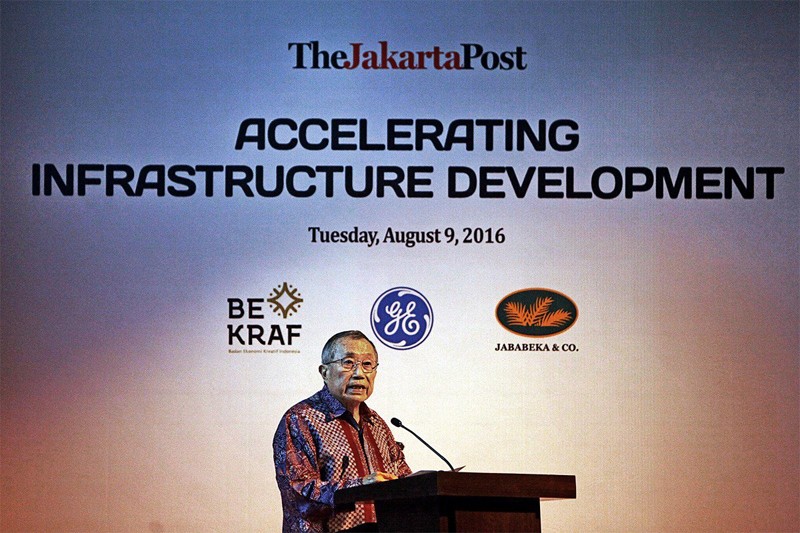Shaping history and future: What peers say about CSIS
With its intelligent insights, ideas and research, academia and the think tank crowd both acknowledge the role that the Centre for Strategic and International Studies has played in shaping both Indonesia’s history and future.
Change text size
Gift Premium Articles
to Anyone

T
he Centre for Strategic and International Studies (CSIS), one of Indonesia’s leading think tanks, is celebrating 50 years since its founding in 1971. According to its peers in the country and from the wider region, the institution has left an important legacy while charting the course for the country’s development.
With its insights, ideas and research, academia and the think tank crowd both acknowledge the role that the CSIS has played in shaping both the country’s history and its future.
Deputy head of the Indonesian Academy of Sciences (AIPI), Sofian Effendi, said the CSIS was greatly influential in shaping Indonesia's public policy, especially under then-president Soeharto's New Order regime.
"Indonesia did not have a lot of think tanks at the time. The CSIS was very influential on the Soeharto administration's policy-making, especially considering the institution was backed by key figures in government," Sofian told The Jakarta Post on Monday.
Sofian, who is a public administration professor at Gadjah Mada University (UGM) in Yogyakarta, said even now the country's policymakers would turn to think tanks like the CSIS for insight to better plan its long-term strategies.
Tri Nuke, head of the social sciences and humanitarian department at the Indonesian Institute of Sciences (LIPI), corroborated Sofian’s comments, saying the CSIS’ ideas and studies had helped “determine the direction of the government’s policies” in its early years.
"Even though the government's ties with private-owned think tanks is currently loosening, the CSIS remains a very important asset for the country and its discernment in the country's macroeconomic sector and international affairs remain very important for policymakers" Nuke said on Monday.
In the early days of its establishment, the CSIS worked closely with the government, providing counsel and fomenting ideas to support the government and other stakeholders such as lawmakers, political parties, businesses and NGOs, especially in strategic and security issues.
The CSIS also reached out to the region and the international community to inform them of Indonesia’s policies and its state of development, while at the same time providing feedback to the government and the general public about development policies and the state of affairs in other countries of importance in the region and beyond.
In cooperation with the International Committee of the Red Cross (ICRC) and Adm. Soedomo, then-deputy commander of the Restoration of Order and Security Command (Kopkamtib), the CSIS helped facilitate the release of some 532,000 former Indonesian Communist Party (PKI) prisoners, who were accused of involvement in an abortive coup in 1965.
In 1978, the CSIS also helped approximately 120,000 Timor Leste refugees who emerged after Nicolau dos Reis Lobato, the Fretilin leader and national hero, was killed.
The CSIS’ close ties with the government, however, were severed in 1987, after one of its founders, Jusuf Wanandi, famously wrote a memo to Soeharto advising him to prepare a new generation of Indonesian leaders after 20 years of his presidency, which the ex-military general took as a call to step down.
However, in reality, the CSIS’ relations with Cabinet ministers and others in government were not completely cut off, and both maintain a close degree of cooperation to this day.
Aside from influencing policy-making in Indonesia, the CSIS has also cemented its role and influence as a leading think tank in Southeast Asia.
The director of the Southeast Asia program of the Sydney-based Lowy Institute, Ben Bland, said that as the country’s premier think tank, the CSIS had made great contributions to cement Indonesia’s place in the world.
"I’ve been lucky enough to work with many excellent CSIS researchers over the years, and their insights have helped me to make sense of Indonesia. It's doing a good job explaining the country to outsiders, explaining the world to Indonesians, and connecting us all in the interest of mutual understanding and cooperation," Bland said.
Other academics, including international relations expert Teuku Rezasyah from Bandung's Padjadjaran University, said the CSIS had also helped nurture students of international relations and new generations of thinkers.
He said the think tank had helped him tremendously during his undergraduate and postgraduate studies. He often visited CSIS seminars and discussions and its libraries during his research.
"The CSIS was like a second home to me. Before the internet era, the CSIS' complete and comprehensive library served as a very important source for students, including myself. The CSIS has a really good network with policymakers and universities, and it has professional, humble and excellent analysts and researchers, who never hesitate to help students," he told the Post recently.









